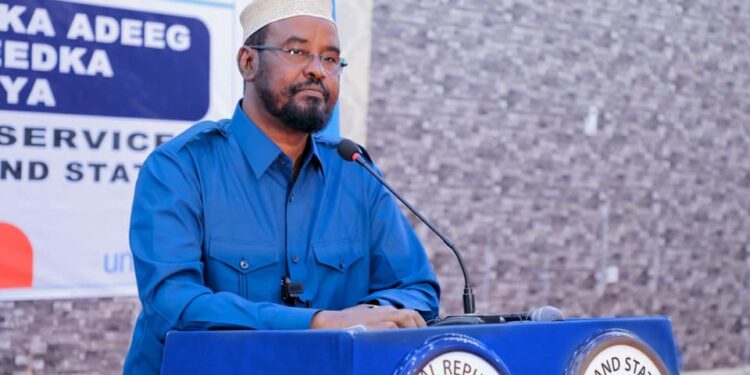(17-09-23) Op-ed — Following the re-election of President Hassan Sheikh Mohamud on 15 May 2022, Somalia has seen various constitutional changes at both the national and state levels. Among these constitutional changes, and possibly the most contested one, is the extension of term limits for Federal Member States’ Presidents and Lawmakers. This has caused an outcry not only among future Federal state aspirants but also from former politicians and national leaders, subsequently becoming a topic of debate not just in Jubaland but throughout Somalia. While some may argue that term limits are necessary for democratic stability, it is essential to explore the broader implications of leadership changes without careful planning or clear political strategies.
Reflecting on Lessons from Somalia’s Past
As Winston Churchill said, ‘Those who fail to learn from history are doomed to repeat it,’ it seems that many of our Somali politicians haven’t learnt much from the country’s previous history, repeating the same political mistakes done in the past. We surely all know or remember how the country descended into anarchy when former President Siad Barre was forcefully removed from power in 1991 by rebel groups without weighing the consequences of their actions. The rebels’ lack of a clear political strategy for post-Barre governance led to prolonged conflict and hindered progress. Equally, the removal of Siad Barre marked a significant turning point in Somali history, leading to a chain of events that ultimately resulted in the complete downfall of the country. Even worse was the fact that Barre’s forceful removal left a power vacuum and a fragmented country fraught with competing interests. The rebels that had united against the former regime soon turned on each other, leading to the disintegration of the state and the emergence of various factions vying for control. The absence of unified leadership and failure to establish strong institutions created a breeding ground for chaos.
More Recent Examples
More recent examples are the sad events that took place in South West State and Puntland in December 2022 and June 2023, respectively. Dozens of people lost their lives after fights broke out between the government forces and forces allied with opposition groups, all in the name of pursuing a forceful regime change.
Reflecting on the Case of Jubaland under President Madobe
As the region prepares for the upcoming presidential elections, it is crucial to reflect on the achievements of the current administration and the importance of maintaining peace and stability. President Ahmed Mohamed Islam, popularly known as Madobe, played a pivotal role in facilitating political negotiations, bringing together various clans, political factions, and international partners. Through inclusive dialogue and consensus-building, President Madobe successfully unified the region, culminating in the formation of Jubaland in 2013. Under President Madobe’s leadership, the region witnessed a significant reduction in violence and the restoration of essential services. These milestones contributed to the stability of Jubaland. The administration has also been relentless in pursuing development initiatives aimed at improving the lives of the people of Jubaland. The region has seen significant investment in infrastructure projects, including road networks, schools, hospitals, and public utilities. These initiatives not only improve the overall quality of life but also enhance economic growth and attract investments.
With the government successfully ending the conflict in Gedo, thanks to the charismatic leadership of President Madobe, it’s time for the government to consolidate its efforts, expertise, and resources to extend its control to the remaining parts of the region urgently but strategically. The Middle Juba and some parts of Lower Juba remain pending assignments for the government in terms of achieving holistic and sustainable peace and stability, especially for the citizens living in these areas who are in dire need of peace, stability, and access to basic services.
Emphasising Development and Peaceful Elections
While every Somali citizen has the right to vie for any political position, as enshrined in the country’s constitution, it’s vital for Jubaland’s presidential aspirants to recognise the dangers of resorting to violence in politics. They should focus on the challenges facing the region and present viable solutions to address them. By placing the people of Jubaland at the centre of their political agendas, aspiring candidates can uplift the region and build upon the progress already attained under President Madobe’s leadership. Recent political statements made by some presidential aspirants in Mogadishu and Nairobi advocating for the forceful removal of President Madobe are neither patriotic statements nor a priority for Jubaland. Instead, aspirants should focus on presenting manifestos that are more constructive and engage in peaceful dialogue towards a peaceful election for a peaceful transition of power.
Conclusion: The Imperative for Peaceful Change
As Somalia continues to grapple with a complex political landscape, the necessity for peaceful transitions and constructive dialogue has never been more critical. The lessons of history are clear: forceful regime changes yield destructive consequences that can set a nation back for decades. Jubaland, under the stewardship of President Madobe, has made significant strides towards stability and development. Therefore, any aspirations for leadership change must be approached with caution, and grounded in strategies that prioritise the well-being of the community above all else.
Aspiring leaders and the electorate alike have a moral and civic duty to promote peaceful elections and a smooth transition of power. In an age where the echoes of past mistakes still reverberate through the corridors of Somali politics, choosing the path of peace is not just a patriotic act; it is an urgent necessity for the continued development and unity of Jubaland and Somalia at large.
About the Author
Abdi Ahmed Aden is a Researcher and Political Analyst with a Master’s Degree in Development Studies, specialising in Conflict Resolutions and Leadership from the University of the Western Cape, South Africa. With over 10 years of expertise in Conflict Resolutions and Leadership, his insights offer a deeply informed perspective on the complex political landscape of Somalia.
Email: abdiahmed2008@gmail.com
















